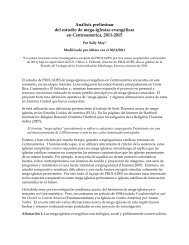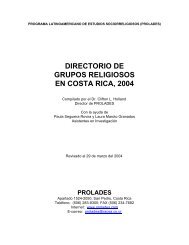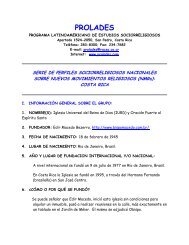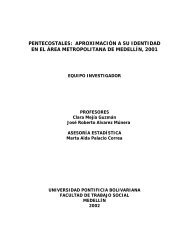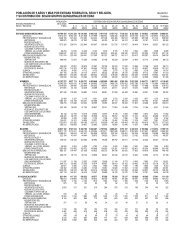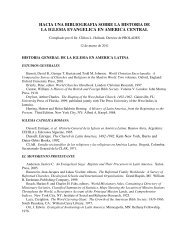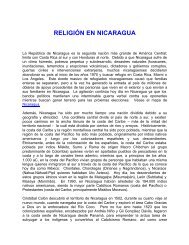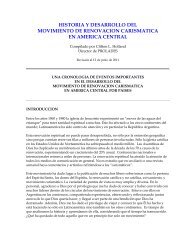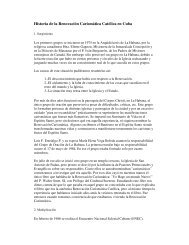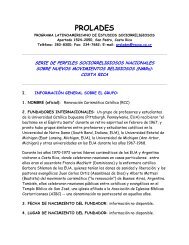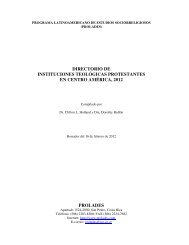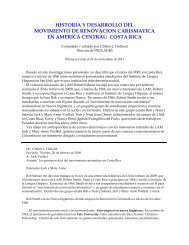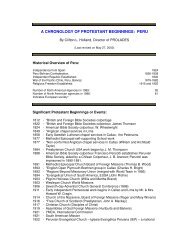belize, 1980 - Prolades.com
belize, 1980 - Prolades.com
belize, 1980 - Prolades.com
You also want an ePaper? Increase the reach of your titles
YUMPU automatically turns print PDFs into web optimized ePapers that Google loves.
Catholic Church. In 1848, the Mayas revolted against both the Mexican government and the large<br />
landowners who had oppressed them since the Spanish conquest, causing heavy losses of life and<br />
property for several years. The resulting Caste War in Yucatan between the Mayans and the<br />
Mestizos during 1847-1853 forced many Indians to flee across the border into British Honduras to<br />
escape persecution and death, a migration that led to the subsequent growth of the Catholic Church<br />
in northern Belize.<br />
The first two Jesuit priests arrived in the Colony in 1851, sent by the Vicar Apostolic of<br />
Jamaica "to preach the faith and convert the heathen." By 1856, the Catholic population was<br />
already second in size to the Anglicans in Belize City. However, the increasing strength of the<br />
Catholic Church in Belize was not only due to the missionary zeal of the Jesuits, but also to their<br />
readiness to leave the <strong>com</strong>forts of the city and work in the remote and backward villages of the<br />
interior. There they found greater responsiveness among the Indians and Mestizos, than among the<br />
Creoles in the coastal settlements.<br />
The growth of the Catholic Church in the Colony during the late 1800s led Pope Leo XIII to<br />
create the Vicariate of Belize in 1893. Although the English Jesuits, always few in number, were<br />
responsible for the early advances of the Catholic Church in Belize, after 1893, the Vicariate was<br />
administered by the American Society of Jesus from Missouri. It was not until 1956, however, that a<br />
Bishopric was created in Belize, but the Missouri Jesuits maintained their control of the Church.<br />
Aiding the Jesuits were several other religious orders, notably the Pallotine Sisters, the Holy<br />
Family and the Sisters of Mercy. These priests and nuns extended the Catholic faith into the most<br />
inaccessible parts of the country and to every ethnic group, where they established churches,<br />
schools and social ministries.<br />
The fruit of their labors is evident in the present position of dominance enjoyed by the<br />
Roman Catholic Church in Belize, which has increased from 59% of the population in 1935 to<br />
65% in 1970. Catholics <strong>com</strong>prised at least 70% of the population in every district of the country in<br />
1970, except for Belize District, where Catholics totaled only 44.4%. By <strong>1980</strong>, however, the total<br />
Catholic population had decreased to about 58.5%, largely due to the recent growth of Protestant<br />
denominations working among Indians and Mestizos.<br />
VI.<br />
MAJOR CHRISTIAN ACTIVITIES<br />
6.1 ECUMENICAL ORGANIZATIONS<br />
Although the Protestant Council has existed for many years, it includes only a few of the<br />
major denominations and is very limited in its activities. However, the Belize Christian Council<br />
(BCC), organized in 1978, en<strong>com</strong>passes a wider range of Christian groups and maintains<br />
cooperative relationships with the Caribbean Conference of Churches and with the World<br />
Council of Churches through the Division of Inter-Church Aid, Refugee and World Service.<br />
Members of the BCC include the Anglican Church (Province of the West Indies), the Methodist<br />
Church (in the Caribbean and the Americas), the Church of the Nazarene, the Church of God in<br />
Christ, the Presbyterian Church, the Seventh-day Adventist Church, the Salvation Army and the<br />
Roman Catholic Church. This organization grew out of a <strong>com</strong>mon desire for greater unity among<br />
Christian churches and for programs that express the life and mission of the Church. Present<br />
ministries include an adult education program for the educationally and economically disadvantaged;<br />
a tutorial program for children and youth to help them <strong>com</strong>plete primary and secondary educational<br />
requirements; a children's home; several pre-schools; and a social welfare program for poor families<br />
and disaster victims. In 1981, the BCC was renamed the Belize Council of Churches.<br />
55



